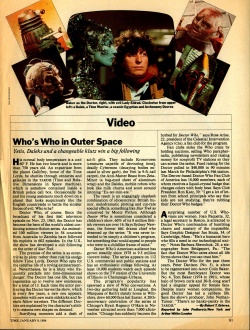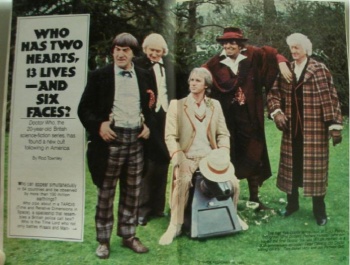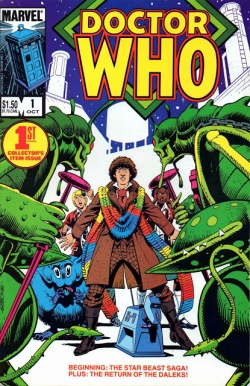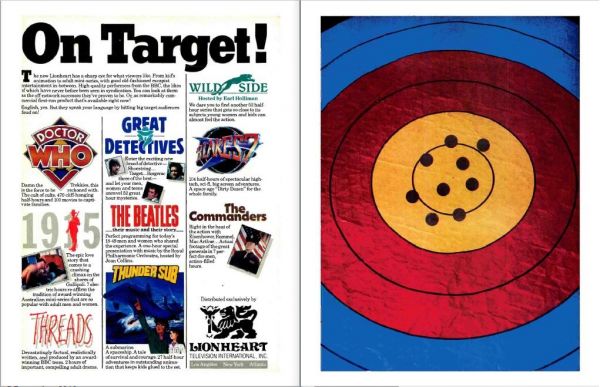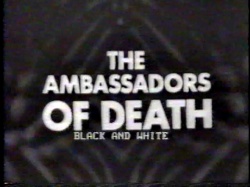United States--1984
| United States Chronology | |
| 1963-1969 | 1971-1972 | 1973-1977 | 1978 | 1979 | 1980 | 1981 | 1982 | 1983 | 1984 | 1985 | 1986 | 1987 | 1988 | 1989 | 1990 | 1991-2020s | |
| Related articles | List of conventions | List of fan clubs | References to the USA in Doctor Who | Doctor Who USA Tour | USA Tour stops | Documentaries and specials | TV Guide | Saturday, March 12, 1988 | First airings by episode |United States by the numbers | Chicago chronology | Time-Life Television |
- 9 January 1984: TIME magazine carries a feature on Doctor Who - "Who's Who in Outer Space". The article declares that the series is seen by 9.5 million viewers in 112 markets across the States.
- 3-5 February 1984: Colin Baker makes his US convention debut in Miami, Florida. Coverage of this event appears in Fantasy Empire issue #12, covered dated July 1984.
- The 18-24 February 1984 issue of TV GUIDE has a four-page article, "WHO HAS TWO HEARTS, 13 LIVES – AND SIX FACES?". This states that Doctor Who is seen in 112 US markets (as had been cited earlier by TIME).
- With all the Jon Pertwee stories now fully cleared for US syndication later in the year, the BBC begins the process of clearing the existing complete 15 William Hartnell and five Patrick Troughton stories.
- With so very few of the black and white serials complete, the BBC begins to actively contact overseas TV stations in the hope of finding some of the missing episodes with which to increase the available package. By the end of the year, they have had some success...
- April 1984: Plans to film part of season 22 in New Orleans fall through, so the filming of The Two Doctors is relocated to Spain.
- The 2-8 June 1984 issue of TV GUIDE has a review by Robert MacKenzie, which basically declares the series to be "cheap and tacky" but easy to get hooked on.
- October 1984: Marvel US commences reprints of Doctor Who Magazine comic strips, picking up from where the four-issue cancelled Marvel Premiere series left off in 1981. (This comic series runs for 23 issues between October 1984 and August 1986.)
- November 1984: Season 21 begins screening in the States. Although The Twin Dilemma has been supplied, stations were given the recommendation not to air the serial until other Colin Baker stories are made available in 1985/86:
PETER DAVISON (continued)
COLIN BAKER
Seven stories, equivalent of 26 episodes (also in "movie length" omnibus editions):
| 6L | Warriors of the Deep | 4 |
| 6M | The Awakening | 2 |
| 6N | Frontios | 4 |
| 6P | Resurrection of the Daleks | (2/4) |
| 6Q | Planet of Fire | 4 |
| 6R | The Caves of Androzani | 4 |
| 6S | The Twin Dilemma | 4 |
- For Resurrection of the Daleks, Lionheart was sent different versions of the episodes including undubbed first edits: early 25 minute cuts of parts 1 and 2 (the latter was missing music and sound effects, and had several extra or extended scenes), plus two 45-minute edits (the second of which was missing music and sound effects). Lionheart created its omnibus "movie" versions by combining the two 45 minute edits. (A few years later, corrected versions with the missing audio were supplied - a fully-dubbed new 4-part edit was known to be shown by Canadian station TVO in December 1986.)
- In 1984, Doctor Who merchandise started to become more readily available through specialist mail-order companies, particularly Starlog Press and Geppi's, as well as the fan clubs.
- By December 1984: As had been announced at Longleat back in April 1983, a full package of Jon Pertwee stories is released for syndication in the US; although the package was made available from the start of 1985, the first serial actually went to air as early as December 1984. (The same third Doctor package had already been sold to Australia and New Zealand.)
- The Pertwee package also included four stories that not had been sold to the States before. Since episode three of Planet of the Daleks was in black and white, the BBC provided an edited version that re-cut episodes two and four, making the story into a five-part serial. Invasion of the Dinosaurs was also re-edited because episode one was in black and white, so the opening titles were all re-captioned (e.g. PART TWO was renumbered PART ONE, PART THREE became PART TWO, etc), and the story was issued as a five parter:
JON PERTWEE (Repackaged)
All 24 stories, 126 episodes issued, with four 'new' stories, equivalent of 20 episodes (also in "movie length" omnibus editions):
| AAA | Spearhead from Space | 4 |
| QQQ | Frontier in Space | 6 |
| SSS | Planet of the Daleks | 5 |
| WWW | Invasion of the Dinosaurs | 5 |
- The copy of Spearhead from Space part 2 that was supplied to Lionheart was a slightly different edit; during the sequence when Ransome is being escorted through the doll factory, in one of the cut-a-ways to dolls on a conveyor belt there is a very brief shot of dolls' shoes which doesn't appear in the 'standard' TV version. This alternative edit was also used for the initial UK and Australian omnibus VHS release. Presumably this was an earlier assembly that the BBC had in its archive.
- Terror of the Autons episode 4 was missing parts of the final battle between the Autons and UNIT; this is because the BBC had supplied Lionheart with a copy from the cut print that had been returned from Australia in 1975.
- At the time the 24-story package deal had been signed off in April 1983, Frontier in Space existed only in black and white. However full colour PAL copies of Frontier in Space were recovered from Australia in late 1983 and these were converted to NTSC and replaced the b/w copies that would have otherwise been in the US syndication package.
- Since Planet of the Daleks and Invasion of the Dinosaurs both had one episode that was in black and white, the serials were re-edited into 5-parters. A supply error by the BBC meant that several stations received and aired the b/w part 3 instead of part 6. It wasn't until 1993 that the proper 6-part version of Planet of the Daleks with its b/w part 3 was made available for US syndication, but with few sales being made then, this version would not have had a very wide distribution.
- A full account of the story behind the issues with and the edits made to Planet of the Daleks can be found HERE
- WILL in Champaign, Illinois is the first station to screen the Pertwee episodes, from 4 December 1984.
- Some stations (such as AETN in Arkansas) inserted a caption over the opening credits to explain that an episode was in "BLACK AND WHITE", done so viewers didn't think there was something wrong with their TV sets!
K9 and Company
- December 1984: The 50 minute spin-off K9 and Company airs at Christmas, although it is not as widely sold as its parent series. (It was also offered by Lionheart as a 2-parter (2 x 25 mins), but as far as we can determine it did not air anywhere in that alternative format.)
| United States Chronology | |
| 1963-1969 | 1971-1972 | 1973-1977 | 1978 | 1979 | 1980 | 1981 | 1982 | 1983 | 1984 | 1985 | 1986 | 1987 | 1988 | 1989 | 1990 | 1991-2020s | |
| Related articles | List of conventions | List of fan clubs | References to the USA in Doctor Who | Doctor Who USA Tour | USA Tour stops | Documentaries and specials | TV Guide | Saturday, March 12, 1988 | First airings by episode |United States by the numbers | Chicago chronology | Time-Life Television |
